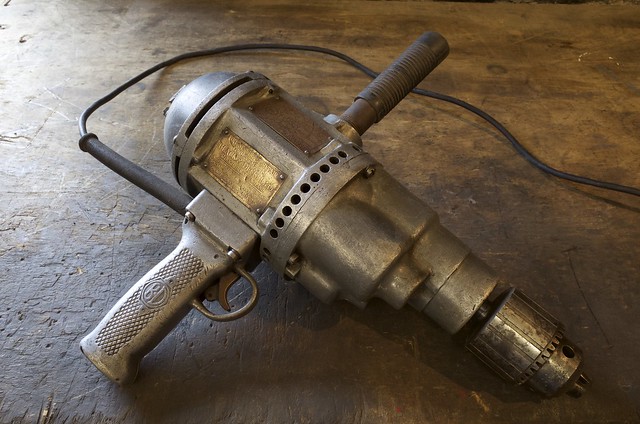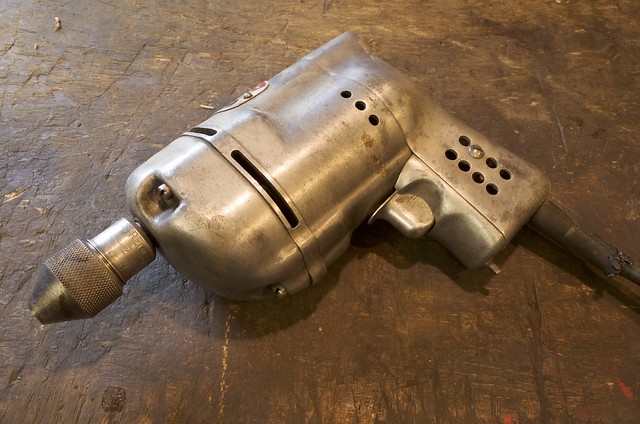Cheshirechappie
Established Member
All my grandparents were born between 1900 and 1910, so they were marrying and setting up home in the difficult years between WW1 and WW2. Neither family had much money left after covering rent, food and other essentials, so there wasn't anything to finance hobbies.
My father's father was an electrician. He worked for GPO Telephones for most of his life, retiring before it became BT. His home 'toolkit' consisted of a thin wooden box about 15" x 9" x 3" deep, with a jumble of bent screwdrivers, odd rusty spanners, a couple of pairs of pliers, a junior hacksaw (blunt), a Warrington pattern hammer with a loose handle, a 2lb ball peen hammer with a short, loose handle - and a selection of rusty, bent nails, odd screws and various loose domestic fittings.
My mother's father was a mechanic, and even his tools were fairly basic at the time of his retirement (which would have been in the late 1960s), though he was better off for tools than Dad's dad. During WW2 he was employed for a while taking military vehicles coming from America through Liverpool docks (as deck cargo, quite often) and making them ready for service. Thus, some of his tools were of American manufacture - apparently the makers were careless enough to leave them in odd places, where they couldn't stay during service (Well - that's what he said, anyway). More importantly from the woodworking point of view, he inherited his landlord's carving chisels and other bits; I still have them - most stamped with an acorn, and probably dating from before the Henry Taylor buyout by Aaron Hildick.
I think this last point shows the difference. Tradesmen had tools, but often couldn't afford more than the essentials, and in general even the respectable working classes couldn't really afford expensive hobbies (even if they had the time to indulge in them). Even the domestic essentials tended to be basic, but were also generally better than some of today's disposable rubbish, and were expected to last. However, one step up the social scale, for someone with a little more disposable income and some time, hobbies were possible, and those who indulged in wood related pastimes could and did buy good tools.
My father's father was an electrician. He worked for GPO Telephones for most of his life, retiring before it became BT. His home 'toolkit' consisted of a thin wooden box about 15" x 9" x 3" deep, with a jumble of bent screwdrivers, odd rusty spanners, a couple of pairs of pliers, a junior hacksaw (blunt), a Warrington pattern hammer with a loose handle, a 2lb ball peen hammer with a short, loose handle - and a selection of rusty, bent nails, odd screws and various loose domestic fittings.
My mother's father was a mechanic, and even his tools were fairly basic at the time of his retirement (which would have been in the late 1960s), though he was better off for tools than Dad's dad. During WW2 he was employed for a while taking military vehicles coming from America through Liverpool docks (as deck cargo, quite often) and making them ready for service. Thus, some of his tools were of American manufacture - apparently the makers were careless enough to leave them in odd places, where they couldn't stay during service (Well - that's what he said, anyway). More importantly from the woodworking point of view, he inherited his landlord's carving chisels and other bits; I still have them - most stamped with an acorn, and probably dating from before the Henry Taylor buyout by Aaron Hildick.
I think this last point shows the difference. Tradesmen had tools, but often couldn't afford more than the essentials, and in general even the respectable working classes couldn't really afford expensive hobbies (even if they had the time to indulge in them). Even the domestic essentials tended to be basic, but were also generally better than some of today's disposable rubbish, and were expected to last. However, one step up the social scale, for someone with a little more disposable income and some time, hobbies were possible, and those who indulged in wood related pastimes could and did buy good tools.


































